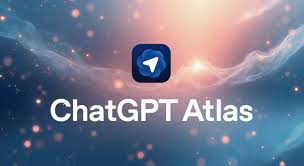OpenAI announced on Tuesday that Atlas, a web browser powered by ChatGPT, will compete with the popular Google Chrome browser.
The statement caused the share price of Alphabet, the parent company of Google, to plummet, indicating that the news had a significant impact on the financial market.
It’s a “rare, once-a-decade opportunity to rethink what a browser can be about and how to use one,” according to OpenAI CEO Sam Altman.
According to OpenAI, ChatGPT has more than 800 million users, despite being a free program
The most valuable startup in the world may start generating revenue from digital advertising if the same widespread adoption of OpenAI’s browser occurs.
Only a few months have passed since one of OpenAI’s executives stated in court that the company would be willing to purchase Google’s market-leading Chrome browser if a federal judge had mandated its sale to prevent the abuses that led to Google’s widely used search engine being deemed an illegal monopoly.
However, this month, U.S. District Judge Amit Mehta denied the Chrome sale that the U.S. Justice Department had requested in the monopoly case, in part because he thought that developments in the AI sector were already changing the competitive environment.
How to get started with Atlas
According to OpenAI’s announcement, ChatGPT Atlas is now available globally on macOS and will soon be available on Windows, iOS, and Android.
Atlas can be downloaded and dropped into the Applications folder on a Mac.
Open Atlas and log in using your ChatGPT account details to start the browser.
After that, users will be prompted to choose whether to make Atlas the default browser, permit keychain access, import data from other browsers, or enable “browser memories.”
By enabling browser memories, ChatGPT may instantly recall previously viewed content or remember pages a user has visited, using this context to tailor future searches.
Why is Atlas new?
“Tabs were fantastic, but since then, there hasn’t been much innovation in browsers,” Altman stated.
According to Altman, he expects Atlas to radically change how people use the internet and envisions future internet usage relying on a web browser and chat experience, similar to how people currently use the search box and URL bar.
Agent mode, which is only accessible in preview for Plus, Pro, and Business subscribers, is one of the primary new features.
Additionally, OpenAI claims that the tool is “better at researching and analyzing, automating tasks, and planning events or booking appointments while you browse.”
In the introductory video, for instance, the team asked ChatGPT to provide the quantities of various ingredients required to prepare a meal for eight people.
With agent mode on, Atlas proceeded to place an Instacart order from Safeway, the supermarket it selected using its browsing history.
In the example, product lead Pranav Vishnu repeatedly stated that the agent may be switched off at any time. Still, he also stressed that Atlas users would need to take into account potentially important new factors.
According to Pranav, “Sharing your browser with ChatGPT offers a whole new set of risks despite all of the power and awesome capabilities you get.”

















